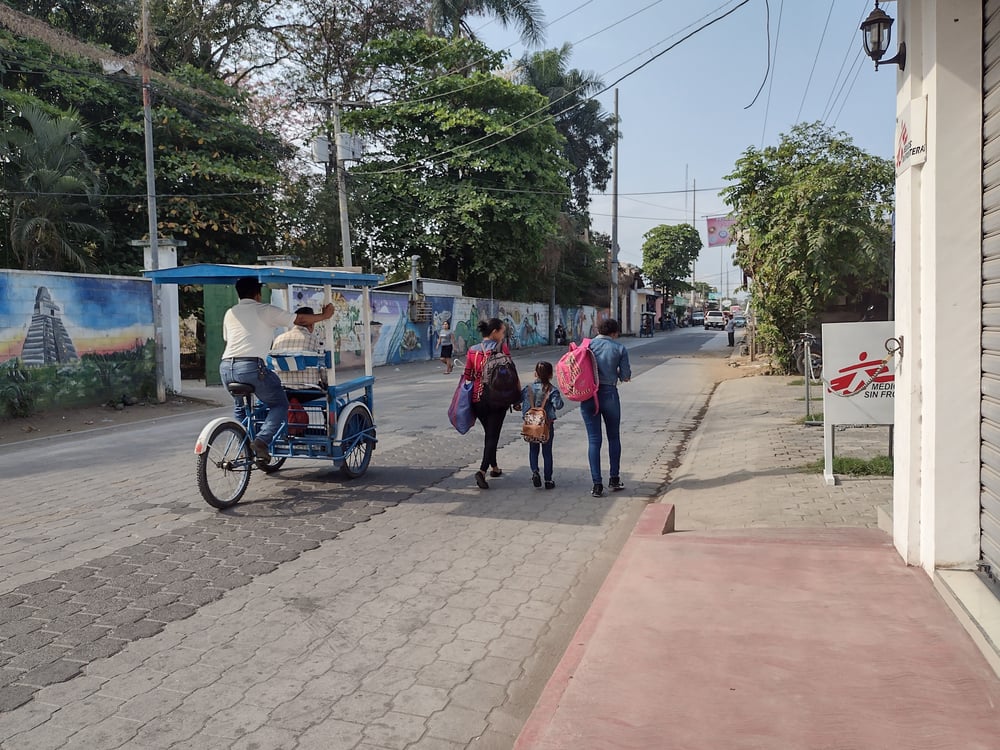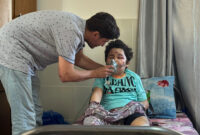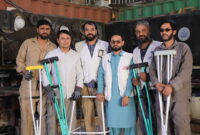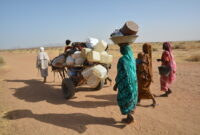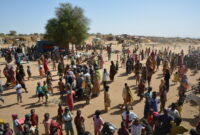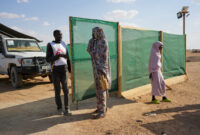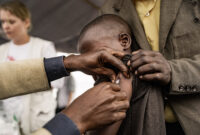“Many people deported to Guatemala find themselves facing an abyss with no possibility of escape”
Since November 2021, a team from Doctors Without Borders/Médecins Sans Frontières (MSF) has been providing medical care and assistance to migrants and deportees passing through Tecún Umán, a city on Guatemala’s border with Mexico.
Like any border town, Tecún Umán is noisy and frenetic. Every day, from very early in the morning until late afternoon, the area around the bridge that connects Guatemala with Mexico across the Suchiate River is crowded with people coming and going, non-stop. It doesn’t matter if it’s Sunday or Tuesday, or if the sun is burning and the heat is overwhelming; whatever the time of day, Tecún Umán is a hive of people on the move.
Because of its location, Tecún Umán has become one of the region’s migration hotspots. Every day, thousands of people pass through this city of 30,000 inhabitants, located in the far west of Guatemala. For most, this is the last stop before entering Mexico through the state of Chiapas. For the rest, it is a stopover on their way back, after being deported from one of Mexico’s detention centres, known as ‘migration stations’, or from a detention centre in the US, where they were confined as part of the two countries’ joint plan to stop the flow of people northward.
Many people arrive with health problems, without sufficient resources to continue their journeys, and carrying the emotional burden of having faced multiple risks and threats during their travels.
The following is an interview with Dr. Miriam Hernández, MSF Mobile Health Activities Manager.
“The influx has been so high that it has exceeded Tecún Umán’s capacity to respond,” says Dr Miriam Hernández, a Mexican doctor who has worked with MSF since 2016 in projects across Mexico, and now coordinates MSF’s mobile activities in Tecún Umán.

What is MSF doing in Tecún Umán?
We assist different groups of migrants: migrants in transit to Mexico and the US; Guatemalans deported from Mexico and the US back to Guatemala; and finally, but to a lesser extent, asylum seekers. Our teams work in three locations: the bus terminal, the centre for returnees, and halfway between these two, the MSF clinic. We have a multidisciplinary team made up of professionals in medicine, nursing, psychology, health promotion, social work, and logistics. We offer free and confidential basic health consultations, mental healthcare, health promotion activities, clean drinking water, and information.
What type of medical conditions are you seeing?
In the centre for returnees we see many health conditions associated with the long journey from the ‘migration stations’ in Mexico; some have travelled for hours, others for several days. We see people with muscle pains, respiratory illnesses and diarrhoea due to the poor quality of the food they receive at the migration stations and during the trip. We see many single adults, families, and unaccompanied minors. It’s shocking to see the buses full of children deported back to Guatemala twice a week.
At the bus terminal we also see people of other nationalities. We have identified several people with mental health problems related to violent situations in their countries of origin and during the migratory journey. These people often face extortion by smugglers, known as ‘coyotes’, harassment by the police, and assaults by common criminals or organized criminal gangs. We frequently see patients who have experienced nervous breakdowns or have physical injuries resulting from these events. We also see people who are not taking their treatment for chronic diseases such as diabetes or hypertension, which is related to the fact that there are more and more elderly people on the migratory route.
We also see some asylum seekers referred by a nearby organization, but in a much more limited way due to security constraints. Many have been in Tecún Umán for months or even years without access to health services. This is partly because the public system does not have the capacity to deal with them but is also due to xenophobia. In recent months, our medical services have provided an option for this group.
What were the main challenges in setting up this project?
The main challenge is that migrants are forced to use informal services far from the reach of aid organizations, so it is very difficult for us to access these people and offer our services. We have worked on this, and these groups of people are starting to familiarize themselves with us, with what we do and why we are here.
Thanks to this acceptance and to our regular presence at the three locations, we are now able to offer vital services to the migrant population.
It has been of fundamental importance to explain our principles: that we are neutral, impartial and independent, and that our only interest is in saving the lives and alleviating the suffering of the most vulnerable people.
Little by little we have opened a space in which to work at and have explained to the local community that we are not in competition with them. They have accepted us because they see that we are not there to take away any of their work. Thanks to this acceptance and to our regular presence at the three locations, we are now able to offer vital services to the migrant population.
How do you provide medical care to people who move so quickly?
I was surprised by the speed at which people pass through the city. We have very little time to reach them and evaluate their health condition. However, there are some basic things that everyone needs, such as water to drink. By offering a hydration kit or giving them a map of the migratory route, we gain a few minutes to explain our services.
We also need to consider that people arrive in fear to an unfamiliar place, and some have recently been assaulted. So, by providing them with clean water, as well as providing information in a disinterested manner, including telephone helplines and information about other MSF points along the route, we can gain their trust. Eventually they will agree to have a medical consultation to assess other health needs that may exist.
What makes this project different from others you have worked in?
Undoubtedly, the specific challenges deportees face are what make this project different. Being a deportee in Mexico is not the same as being a deportee in Guatemala. Many of those who return here cannot return to their homes, so they face the dilemma of seeking asylum in Tecún Umán, if they are foreigners, or trying to return north. The people who are stranded here live in a very precarious situation. We have seen Guatemalan deportees arrive without the money even to make a phone call; a few days later we see them living on the street.
It is also very complicated when people arrive without their documents. Even if they are citizens of this country, not having an identity card causes multiple problems: they can’t get vaccinated, they can’t request a medical consultation, they can’t receive money sent to them by their relatives etc. It is very hard because, in addition to being returned to a country from which they tried to flee, when they arrive here, they face an abyss and with no possibility of escape.
